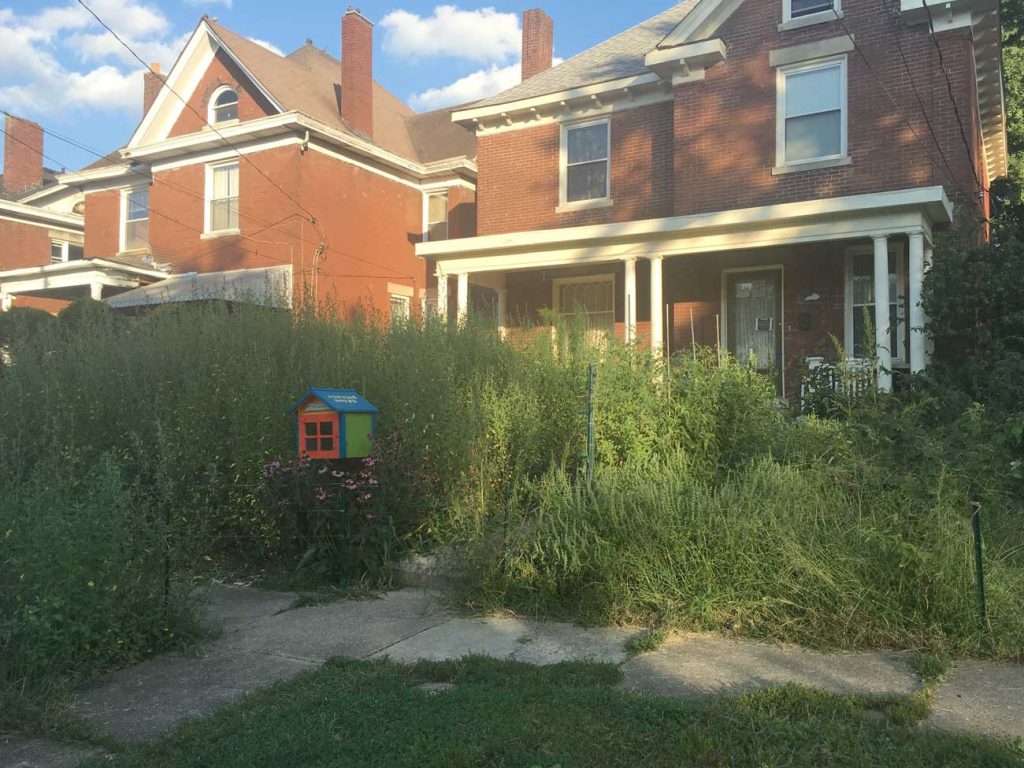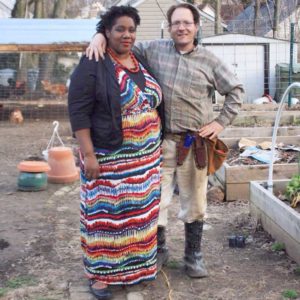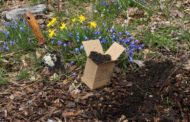THE AMOS FARM: Season’s End and Putting Your Garden to Bed
by Christian Torp
You shall sow your land for six years and gather in its yield, but on the seventh year you shall let it rest and lie fallow, so that the needy of your people may eat; and whatever they leave the beast of the field may eat. You are to do the same with your vineyard and your olive grove.
Exodus 23:10-11 NASB
It’s season’s end and the sun sinks low into the trees. Pastoral evening light shimmers through your front yard and reflects off the roof of your truck. The noise of children playing is obscured by nine feet of soil builder cover crop (a.k.a. “weeds”) that are your front yard.

These 9-foot cover crop (aka. weeds) really do cover Christian’s front lawn in Lexington, KY. -Photo by Christian Torp
A group talks before the corner store. A can of beer sits on the table beside you on the porch. It’s warm and it’s pleasant out, but it’s also a little sad at season’s end.
School busses are running again. Traffic over by the college is atrocious. It’s fall.
It’s gardening time yet. The sun’s bidding adieu at only 7:15 p.m., but it’s still gardening time. Your crops are coming in. Some may be done, gone, dried and stored already. It’s gardening time still. Your vines have succumbed to blossom end rot (it’s probably calcium deficiency). It’s still summer. A few weeds are towering over your low lying crops. The bugs are bad for you and the plants… It’s time to prepare for the end of the season.
Your garden is a living organism. It is a thriving ecosystem that should be improving over the successive years that you tend to the land.
Though both you and your garden are worn out at season’s end, preparation now is worth so much in the spring, and so much for you, your expertise and gardening satisfaction.
A worn out, spent and dying garden is a jackpot. Your soil is a natural bank. You can only get out what you put in. As such, the first thing you want to do is prevent any unauthorized withdrawals.
Don’t pull your plants out of the ground! Either leave them there to decay back into the soil or cut them off at ground level. Half of a plant is underground. Why tear out all that organic matter and destroy the soil structure?
Secondly, plant cover crops in those areas that are now or will soon be cleared. Lay cardboard covered with mulch, compost or manure over areas that will be producing right up until frost. See this UMaine article, Cover Crops for Season’s End: https://extension.umaine.edu/gardening/blog/2011/07/12/maine-home-garden-news-11/#cover
Keep and collect all of the leaves that you can, while the getting’s good. As trees aren’t sprayed like lawns, grabbing bags of leaves that are left out to be collected is a great carbon and mulch source. They will last throughout the following year, so place them in a dry place.
Garlic, who doesn’t love it? It’s delicious, stores well and prevents erosion. Better yet, it’s a fall planted crop. Time your planting to allow the clove to establish a root system, but not so early that the top emerges and is prone to winter injury. Soft neck garlic has smaller, typically more numerous cloves that store better (for as long as a year). Hard neck garlic is hardier, with larger cloves that produces delicious scapes in the early summer. (P.S.: clip scapes early next year, they get tough quickly). UMaine Extension publication on garlic: https://extension.umaine.edu/agriculture/programs/garlic/
Exceptional and favorite plants should be maintained and improved upon. Next month The Amos Farm will get into seed saving, but the thing to do now is take notice of above average (non-hybridized) plants. Identify the genomes that you want to save and put aside the best examples of their yields (fridge, freeze or dry).
Finally, get your note taking system and skills up to speed. Don’t repeat the same mistakes you made this season. Don’t wait too late to do what you should have done earlier this year.
Tune into The Amos Farm in October for seed saving and again in November for vegetable storage.
Christian L. Torp is an attorney, missionary, activist, urban-farmer and advocate for social change who lives at Justice House (Facebook: Justice House) with his wife, Tanya in Lexington, KY.
If you have any questions or comments for Christian, or there’s something you’d like to know more about, please reach out to him at theamosfarm@gmail.com or The Amos Farm on Facebook.





